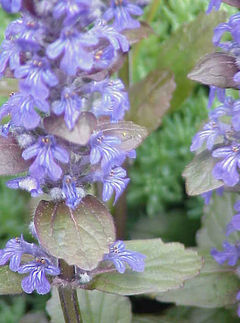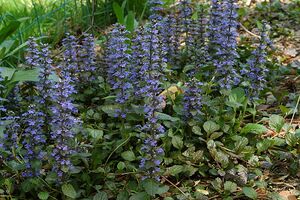Ajuga reptans
| Ajuga reptans subsp. var. | Carpet Bugle, Blue bugle, Bugleherb, Bugleweed, Carpetweed, Common bugle | |||||||||||||||||||||||||||||||||||||||||||||||||||||||
|---|---|---|---|---|---|---|---|---|---|---|---|---|---|---|---|---|---|---|---|---|---|---|---|---|---|---|---|---|---|---|---|---|---|---|---|---|---|---|---|---|---|---|---|---|---|---|---|---|---|---|---|---|---|---|---|---|

|
|
| ||||||||||||||||||||||||||||||||||||||||||||||||||||||
| ||||||||||||||||||||||||||||||||||||||||||||||||||||||||
| Standard Cyclopedia of Horticulture |
|---|
|
Ajuga reptans, Linn. St. prostrate: Ivs. ovate or obovate, entire or sinuate, shiny. — A low, dense, fast-spreading creeper, excellent for covering shady slopes. The typical and white-fld. forms are less cult. than the following: Var. rubra, Hort. More valued for its dark purple Ivs. than its blue fls. Var. variegata, Hort. Fig. Lvs. splashed and edged creamy yellow. Var. atropurpurea, Hort. Fls. purplish blue. May. — Useful for carpeting the ground in shady places.
|
Ajuga reptans is a herbaceous flowering plant native to Europe. This plant is often used as medicinal and ornamental plant.
It has dark green leaves with purple highlights. It is a spreading ground cover that grows in a dense mat. The leaves grow 2-3 inches high but in the spring it sends up 4-6 inch tall flower stalks with many purple flowers on them.

In folklore
Ajuga reptans is also known as "carpenter's herb" due to its supposed ability to stem bleeding.[1]
References
- ↑ Howard, Michael. Traditional Folk Remedies (Century, 1987), p108
- Bailey, L. H. (2005). Manual of Gardening (Second Edition).. Project Gutenberg Literary Archive Foundation.